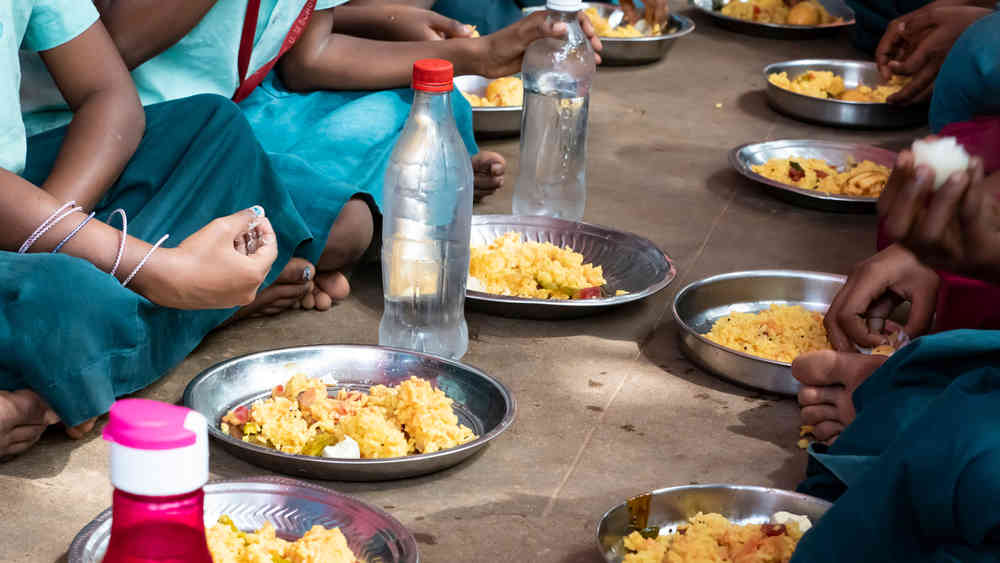On August 15, during his Independence Day speech, the prime minister announced the mandatory fortification of rice. Although the Niti Aayog termed it as a “game changer”, it also admitted, “that every second woman is anaemic, every third child is stunted and malnourished and every fifth child is wasted. Further, over 70 per cent of the population consumes less than 50 per cent of the Recommended Dietary Allowance...”
Why is it that despite recognizing lack of food as the root cause of the problem, the Centre is focusing on the lack of micronutrients to solve it? What is it that pushes the government to opt for fortification with micronutrients rather than investing in increasing the availability of diverse foods?
India is facing another challenge: rising incidences of non-communicable diseases like obesity, diabetes and heart ailments. An important cause of this new epidemic is the aggressive marketing and the rising consumption of ultra-processed foods — usually high in salt, sugar or bad fats. The food industry continues to resist attempts to provide information about its unhealthy content.
Two policies — the fortification and the marketing of ultra-processed food — have been brought into question. But vested interests infiltrate most of the discussions on influencing decisions. Yet, there is hardly any discussion on ethics and conflicts of interest among those entrusted with policy development.
In 2002, The Wall Street Journal published “Gates Fights Malnutrition With Cheese, Ketchup and Other Fortified Food Items” that brought to light how the Gates Foundation set up the Global Alliance for Improved Nutrition with a grant of $50 million. GAIN, in turn, signed up with major food companies for them to add nutrients like iron, folic acid, and Vitamin A to their food products for poor nations, offer technical assistance to governments and fund public campaigns for the governments to earn ‘Seal of approval’. GAIN was to help with favourable tax policy and regulatory review. In 2015, Bill Gates and Ratan Tata penned an opinion piece where they recommended fortification as one of the most cost-effective solutions among others.
The Food Safety and Standards Authority of India has set up a Food Fortification Resource Centre. As per the FSSAI’s website, it works with GAIN, Nutrition International, the World Food Programme, Tata Trusts, The India Nutrition Initiative and the Food Fortification Initiative. An examination of their partners and donors traced the links of these organizations to the food and the nutrients industry. It is evident that the interests of the food industry prevail. Incidentally, rice fortification with iron could consume 2,600 crore of taxpayers’ money. The FSSAI organized a ‘stakeholders’ meeting held on May 25, 2021, to discuss this policy. Twenty-two out of 28 participants were from the food industry or its associations. Aggressive marketing of unhealthy ultra-processed foods is responsible for their rise in consumption. There is growing evidence that the consumption of ultra-processed foods is associated with the rise in non-communicable disease. But then the food industry has its eye on the bottom-line.
A BMJ publication recently suggested that businesses influence the policy on nutrition through narratives like ‘the body needs nutrients’ as well as ‘manipulation of nutrition science’ through the funding of experts. Given the negative impact of unhealthy food on human health, we believe that the food industry should not be partnering with India’s food and nutrition policymaking. In 2011, the Supreme Court observed conflict of interest in FSSAI panels and directed that scientific panels of the FSSAI should include independent experts instead of representatives from the industry. The same principle could be applied when it comes to constituting a group concerning food/nutrition policy development.
Changing the narrative from single nutrient to dietary patterns may solve the problems of both under and over nourishment in India. Political will is the need of the hour.
Arun Gupta is Convener, Nutrition Advocacy in Public Interest
Navdeep Khaira is a nephrologist at Fortis Ludhiana and a member of the Alliance against Conflicts of Interest










